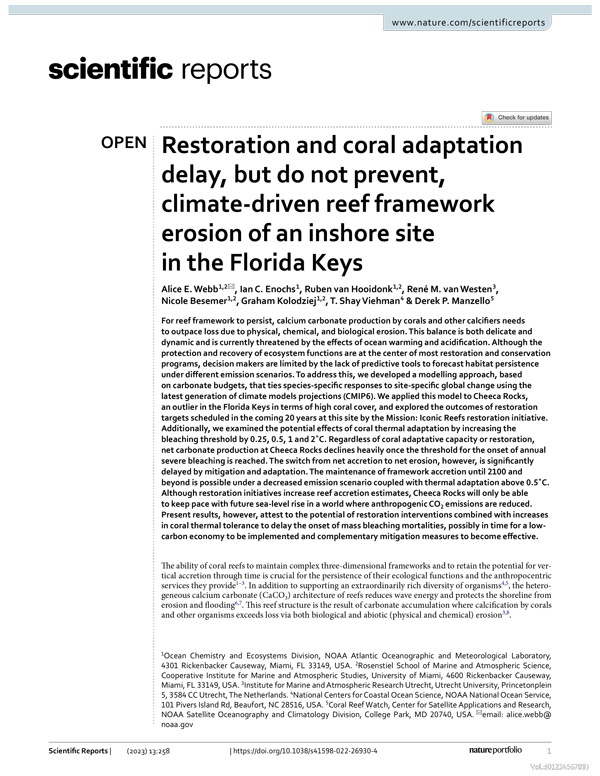Webb, A.E., Enochs, I.C., van Hooidonk, R. et al. Restoration and coral adaptation delay, but do not prevent, climate-driven reef framework erosion of an inshore site in the Florida Keys. Sci Rep 13, 258 (2023).
For reef framework to persist, calcium carbonate production by corals and other calcifiers needs to outpace loss due to physical, chemical, and biological erosion. This balance is both delicate and dynamic and is currently threatened by the effects of ocean warming and acidification. Although the protection and recovery of ecosystem functions are at the center of most restoration and conservation programs, decision makers are limited by the lack of predictive tools to forecast habitat persistence under different emission scenarios. To address this, we developed a modelling approach, based on carbonate budgets, that ties species-specific responses to site-specific global change using the latest generation of climate models projections (CMIP6). We applied this model to Cheeca Rocks, an outlier in the Florida Keys in terms of high coral cover, and explored the outcomes of restoration targets scheduled in the coming 20 years at this site by the Mission: Iconic Reefs restoration initiative. Additionally, we examined the potential effects of coral thermal adaptation by increasing the bleaching threshold by 0.25, 0.5, 1 and 2˚C. Regardless of coral adaptative capacity or restoration, net carbonate production at Cheeca Rocks declines heavily once the threshold for the onset of annual severe bleaching is reached. The switch from net accretion to net erosion, however, is significantly delayed by mitigation and adaptation. The maintenance of framework accretion until 2100 and beyond is possible under a decreased emission scenario coupled with thermal adaptation above 0.5˚C. Although restoration initiatives increase reef accretion estimates, Cheeca Rocks will only be able to keep pace with future sea-level rise in a world where anthropogenic CO2 emissions are reduced. Present results, however, attest to the potential of restoration interventions combined with increases in coral thermal tolerance to delay the onset of mass bleaching mortalities, possibly in time for a low-carbon economy to be implemented and complementary mitigation measures to become effective.
